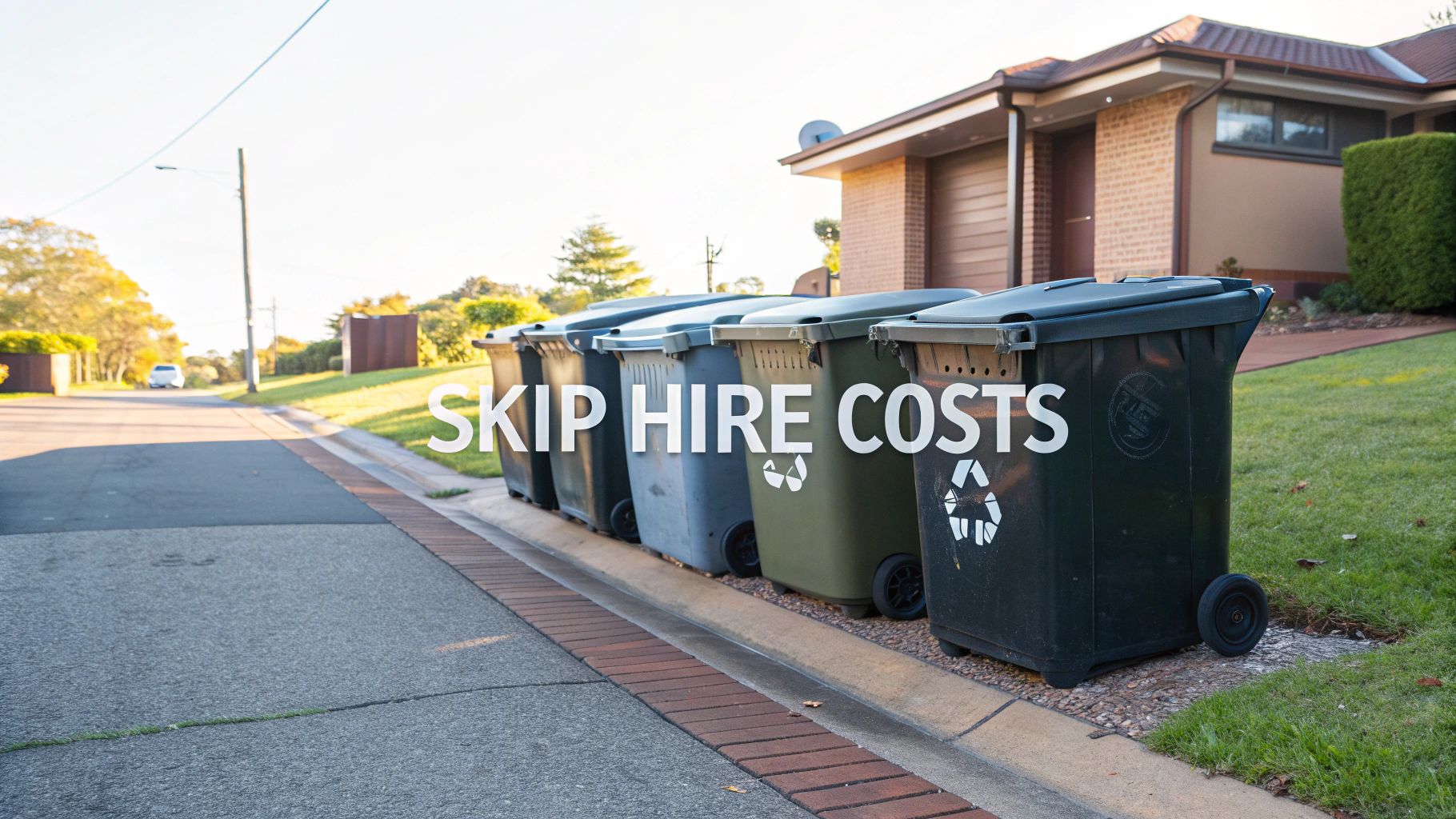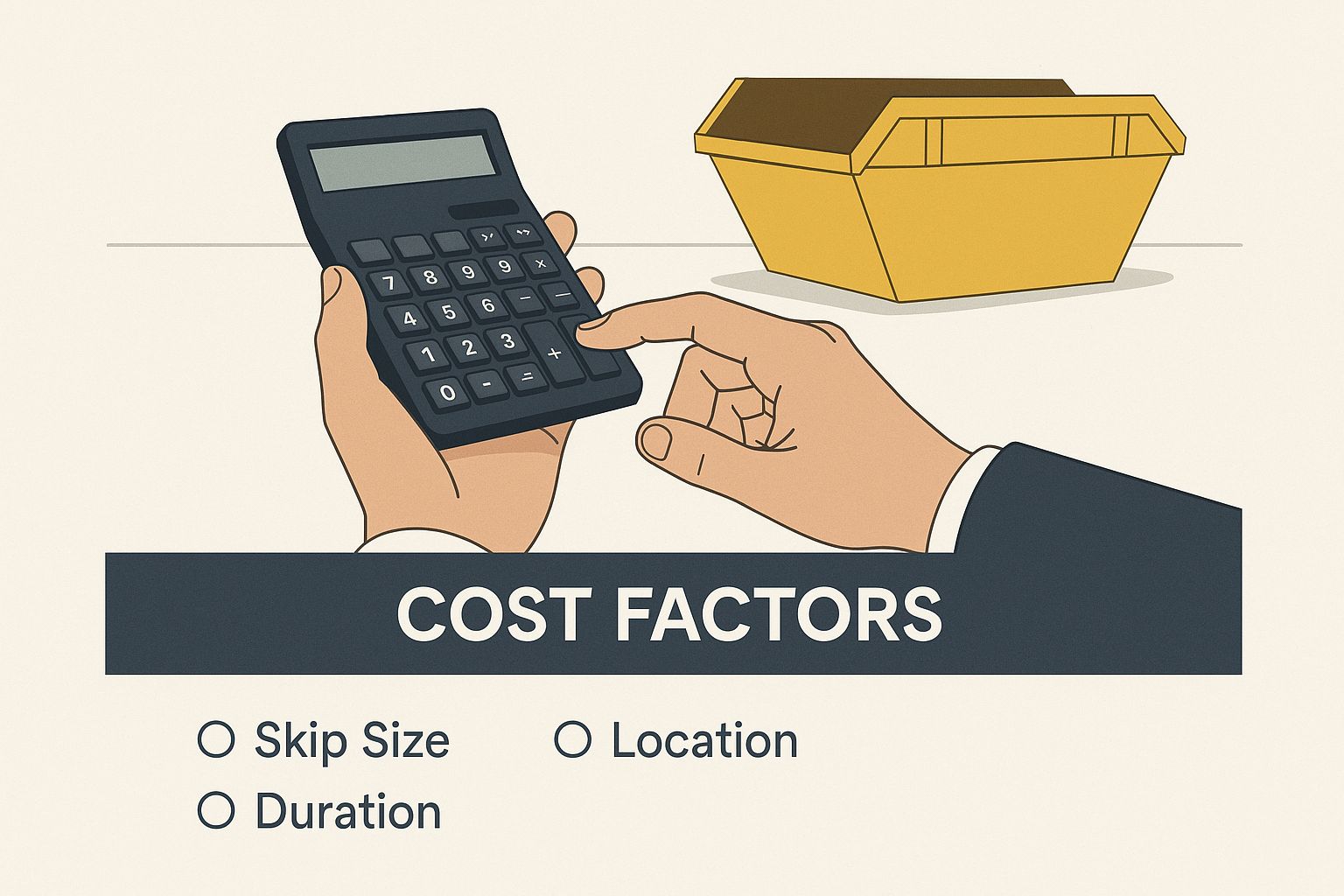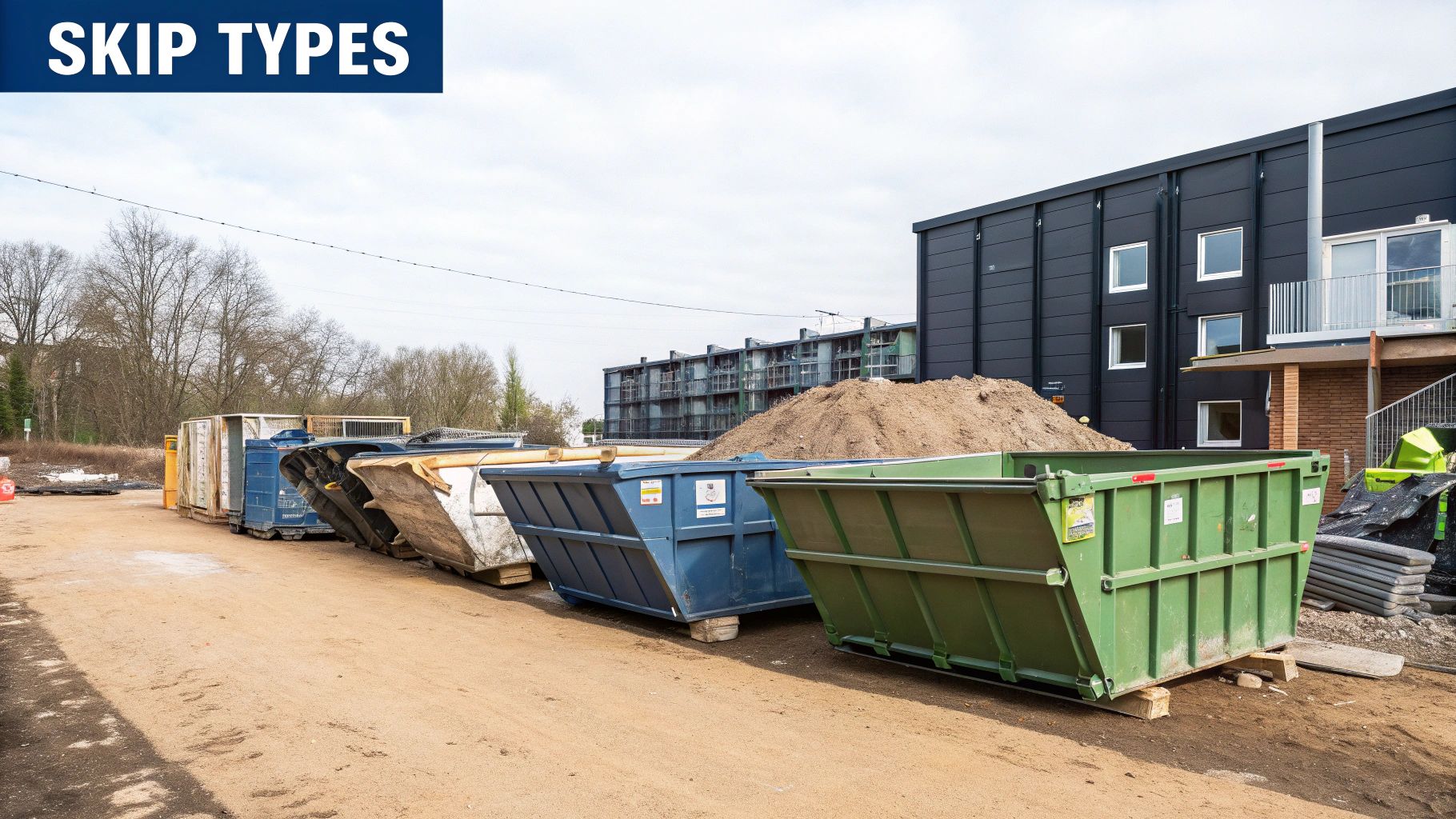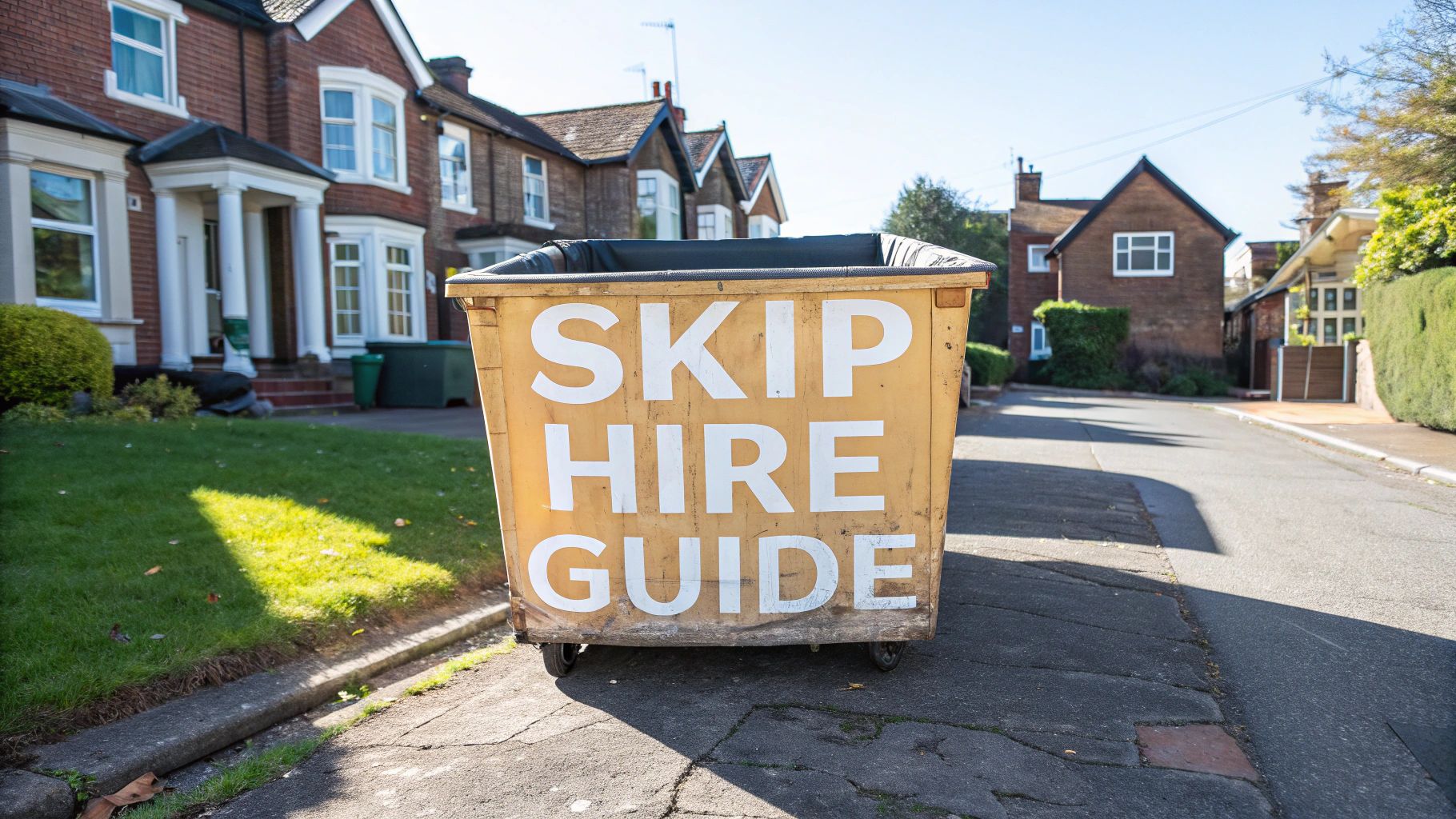Demystifying Skip Hire Bournemouth Prices

Demystifying Skip Hire Bournemouth Prices
Trying to get a straight answer on skip hire prices in Bournemouth can feel like you’re trying to nail jelly to a wall. You’ll see figures bandied about, with costs typically starting around £150 for a small 4-yard skip and climbing to over £300 for a larger 8-yard builder’s skip.
But here’s the thing: that initial price is just the beginning of the story. Think of it less as a fixed price tag and more as a starting point, because other factors like council permits and the type of waste you’re chucking out will definitely shape the final quote.
Your Guide to Skip Hire Prices in Bournemouth

Figuring out the cost of hiring a skip shouldn’t be a puzzle. At its core, the price is driven by size. A ‘mini’ skip for a weekend garden clear-out is naturally going to be lighter on the wallet than a hefty ‘builder’s skip’ needed to handle the debris from a full kitchen renovation. Simple enough, right?
But just like ordering a coffee, where adding an extra shot or oat milk bumps up the cost, a few other key details will adjust your final bill. The main variables that build on that base price are:
- Hire Duration: How long you actually need the skip for.
- Permit Costs: An unavoidable fee from the council if the skip needs to sit on a public road.
- Waste Type: What you’re throwing away matters. Soil and rubble are treated differently to general household clutter, for instance.
To give you a clearer idea of what to expect, the table below breaks down the typical costs for the most common skip sizes you’ll find in Bournemouth.
Estimated Skip Hire Prices in Bournemouth by Size
This table is designed to give you a quick at-a-glance idea of what you might pay for the skip itself. Remember, these are just estimates for the Bournemouth area and don’t include extras like permits or charges for specific waste types.
For a more in-depth look, you can always check out our complete guide to Bournemouth skip hire prices.
| Skip Size (Cubic Yards) | Common Uses | Estimated Price Range (£) |
|---|---|---|
| 4-Yard (Mini Skip) | Small garden clear-outs, minor DIY projects | £150 – £190 |
| 6-Yard (Small Builders) | Bathroom refits, larger garden waste | £220 – £260 |
| 8-Yard (Builders Skip) | Full kitchen renovations, house clearances | £280 – £330 |
Once you get your head around these core elements—size, how long you need it, where it will be placed, and what’s going inside—you’re in a much better position to budget properly and avoid any nasty surprises on the final bill. In the next few sections, we’ll dive into each of these factors one by one.
Choosing The Right Skip Size For Your Project
The single biggest thing that will influence your skip hire quote is its size. Getting this right is a bit of a balancing act. If you go too large, you’re just paying for empty space. But if you go too small, you’ll face the frustrating and costly job of ordering a second one. Nailing this decision is the first step towards getting the best value on Bournemouth skip hire prices.
Think of it like packing for a holiday. You wouldn’t lug a giant suitcase around for a weekend city break, but you also wouldn’t try to cram two weeks’ worth of clothes into a tiny carry-on. The same logic applies to getting rid of your rubbish. Every project creates a different amount of waste, and there’s a skip size designed to handle it perfectly.
Matching Skips To Common Projects
To help you get a better picture of what you might need, let’s link the common skip sizes to the kinds of jobs they’re best suited for. This practical approach takes the guesswork out of it and helps you choose the right option with confidence.
- 4-Yard ‘Mini’ Skip: This is your go-to for smaller tasks. It’s absolutely perfect for a weekend garden clear-out, decluttering a single room like the garage or shed, or for the waste from a minor DIY job. It can hold about 40 standard bin bags.
- 6-Yard ‘Small Builder’s’ Skip: A step up in size, the 6-yarder is one of the most popular choices for home projects. It can comfortably take all the waste from a bathroom renovation or a medium-sized kitchen refit.
- 8-Yard ‘Builder’s’ Skip: This is the biggest size you can usually put on a public road and is the industry standard for major construction and renovation work. It’s ideal for a full house clearance or the debris from a big building project, holding roughly 80 bin bags.
The image below breaks down the key factors that make up the final cost, with the skip’s size sitting right at the top of the list.

As you can see, while a few things play a part in the final bill, figuring out the right size is your first and most important job.
Visualising Volume And Making The Right Choice
It can be really tricky to guess how much waste you’ll actually have. One great tip is to gather all your rubbish into a single pile before you order the skip. This gives you a much clearer visual idea of the space you’re going to need.
If you find you’re stuck between two sizes, it’s nearly always cheaper to go for the larger one. The price difference between sizes is often pretty small compared to the expense and hassle of hiring a second skip later on. For a more detailed look, our guide on https://www.thewastegroup.co.uk/news/what-size-skip-do-i-need-2/ offers even more advice.
The idea of estimating capacity correctly is universal. It’s just as vital to pick the right skip size as it is when choosing the right size for a project like a storage unit, making sure you only pay for the space you actually need.
By taking a moment to properly size up your project’s waste, you can match your needs with the perfect skip, avoid unnecessary spending, and make sure your job runs without a hitch.
Understanding Council Permits and Placement Costs

It’s one of the most common things people forget, but it can seriously inflate your skip hire Bournemouth prices: the council permit. This is a detail that’s all too easy to overlook, but getting it wrong can cause some major headaches and unexpected bills.
The rule of thumb is straightforward: if your skip needs to sit anywhere on public land, you absolutely must have a permit. This covers the road outside your house, a grass verge, or any pavement. You can think of it as renting a parking spot for your skip directly from the council.
On the flip side, if you’ve got a private driveway, a front garden, or any other patch of ground that belongs to your property, you’re in the clear. You can place the skip there without needing a permit at all. This is easily the number one way to knock a decent amount off your hire cost.
Navigating BCP Council Permits
For any project here in the local area, you’ll be dealing with the Bournemouth, Christchurch and Poole (BCP) Council. The process itself isn’t a nightmare, but you do need to plan ahead. Your skip hire company will almost always sort out the application for you, as they have all the necessary insurance and licenses ready to go.
That permit cost, however, is passed straight on to you. While the fees can change, they usually add a noticeable chunk to your final invoice. It’s also really important to remember that these things aren’t instant. It can take several working days for the council to give the green light, so you have to build that lead time into your project’s schedule.
Trying to get away without a permit is a risky game. The council can hit you with some hefty fines and might even demand the skip be removed immediately. That means major disruption and extra charges for a wasted trip.
Comparing Placement Options
Let’s look at what this means in the real world. The decision to place a skip on public or private land has a direct knock-on effect on both your wallet and your timeline.
- Private Land (e.g., Your Driveway)
- Permit Cost: £0. A simple, direct saving.
- Timeline: No waiting around. You can often arrange for next-day delivery.
- Convenience: The skip is right there on your property, making it much easier and quicker to load up.
- Public Road or Verge
- Permit Cost: An extra fee on top of your hire cost (it’s always best to check with your provider for the current BCP Council rates).
- Timeline: Expect a waiting period of 3-5 working days for the council to process and approve the application.
- Requirements: The skip must be kitted out with safety lights and cones, which your hire company will provide.
In the end, spending just a few minutes with a tape measure in your driveway or garden could be the smartest move you make. If you can squeeze the skip onto your own land, you’ll not only save money but also sidestep the paperwork and get your project moving that much faster. Always have a quick chat with your skip hire company about the exact dimensions of the skip you need to make sure it will fit safely.
How Waste Type Influences Your Final Quote
When you’re budgeting for a skip, it’s easy to just focus on the size. But what you actually plan to throw inside it plays just as big a part in your final skip hire Bournemouth prices.
It’s a bit like posting a parcel. A small, light box is always going to be cheaper to send than a huge, heavy one filled with restricted items. The same logic applies to getting rid of your waste.
Skip hire companies have to categorise waste to make sure everything is handled safely, legally, and efficiently. Different materials have different disposal routes, and each one comes with its own costs. For example, a skip full of clean soil and rubble is far cheaper and easier for a waste company to process than one jam-packed with a random mix of household clutter.
The reason? Mixed waste has to be painstakingly sorted by hand at a waste transfer station. This separates all the recyclable bits from the stuff that’s truly destined for landfill. It’s a labour-intensive job, and that operational cost naturally gets reflected in the price you pay.
Understanding Waste Categories And Their Costs
To really get your head around a quote, it helps to know how waste is usually grouped. Most skip companies in Bournemouth will ask what you’re getting rid of and price the job based on your answer.
- General Mixed Waste: This is the most common one, covering that typical mix of household stuff like old furniture, broken toys, and general clutter from a clear-out. It’s usually the standard price because it needs the most sorting.
- Green Waste: This is all your garden stuff – grass cuttings, branches, leaves, and soil. In some cases, ordering a dedicated green waste skip can work out slightly cheaper.
- Inert Waste: This covers materials like soil, rubble, concrete, and bricks. Skips for inert waste are often offered at a lower price simply because the contents can be recycled into construction aggregates with relative ease.
The main takeaway here is that a bit of sorting on your end can sometimes lead to savings. If you’ve got a massive pile of a single material, like soil from digging new foundations, it’s always worth asking your provider if they offer a better rate for a single-stream skip.
For a complete breakdown of how different factors impact your bill, our guide on skip hire prices in Bournemouth offers further details.
The Items You Absolutely Cannot Put In A Skip
Every skip hire company has a strict list of things you can’t put in their skips. Trying to sneak these items in is not only dangerous, but it can also land you with some serious financial penalties. In some cases, the driver might even refuse to collect the skip altogether.
Never try to conceal hazardous materials at the bottom of a skip. Companies are legally required to process waste responsibly, and prohibited items will always be found during sorting, potentially resulting in fines and extra charges passed directly to you.
Items that are almost always banned include:
- Asbestos
- Plasterboard (unless you’ve arranged it separately)
- Refrigerators and Freezers
- Tyres
- Gas Cylinders
- Batteries
- Paint, Solvents, and other Liquids
- Electricals (WEEE waste)
How Landfill Tax Directly Affects Your Quote
A big, often invisible, factor pushing up costs is the UK Landfill Tax. This is a government tax designed to make sending waste to landfill more expensive, which in turn encourages everyone to recycle more. This rising tax has a direct knock-on effect on the disposal fees that skip companies have to pay.
To put it into perspective, the standard landfill tax per tonne has jumped from £91.35 in 2019 to £126.15 by April 2025. That’s a huge 38% increase in just six years – a significant cost that waste management firms have no choice but to build into their pricing.
This is why separating your waste properly isn’t just good for the planet; it’s also a key part of keeping skip hire affordable for everyone.
The Hidden Factors Driving Skip Hire Prices
When you get a quote for a skip, it’s natural to think the price is all about the size you’ve chosen and your postcode. But the final number is actually shaped by much bigger, behind-the-scenes economic forces.
It’s a bit like the price of your morning coffee. You’re not just paying for the beans and the milk; the cost of global transport, packaging, and even the farmer’s fuel all get stirred into that final price. In the same way, skip hire Bournemouth prices are tied to wider market pressures that local companies have very little control over. Knowing what these are helps explain why a quote might look different today than it did six months ago.
Supply Chain and Material Costs
A huge part of the cost comes down to what it takes to make and maintain the skips themselves. Skips are tough, heavy-duty steel containers, and the global price of steel can swing wildly. When steel prices shoot up, the cost to build new skips or repair old ones goes right up with them, and that extra expense has to be factored into hire prices.
Then there’s the fuel. Skip hire is fundamentally a logistics business, relying on lorries to get skips delivered and collected. When diesel prices climb, the cost of every single journey rises. This isn’t a small detail—fuel can be one of the biggest overheads for any skip hire firm. These unpredictable costs make it incredibly difficult to set stable, long-term prices.
The reality is that external economic pressures play a huge role. From the steel used to build the skips to the diesel needed to deliver them, global market changes have a direct and immediate impact on local hire costs.
The Impact of Economic Pressures
These aren’t just abstract ideas; they have a real, measurable effect on the price you pay. Right here in Bournemouth and across the UK, skip hire costs have seen some serious ups and downs because of these exact pressures.
For instance, industry analysis shows that between 2022 and 2025, the cost of raw materials like steel surged by an eye-watering 31%. This was made even worse by unstable diesel prices, which hit haulage expenses hard. It’s now estimated that these supply chain issues account for around 34% of price fluctuations in the skip hire world—a figure that has almost doubled in recent years. You can find out more about these supply chain challenges and their effect on skip hire prices.
By understanding these background factors, you can see that pricing isn’t just a number plucked out of thin air. It’s a direct reflection of a complex chain of economic events.
Why New Waste Regulations Affect Your Bill
It’s not just the rising cost of fuel or steel that might be nudging up your bill. New environmental rules are changing the game for skip hire Bournemouth prices, and it’s worth knowing how they affect what you pay.
At the heart of this shift is something called mandatory waste segregation. In the past, a skip full of mixed waste was a relatively straightforward job. Now, strict new regulations mean skip hire companies have to meticulously sort every single thing at their depots. Trust us, it’s not a quick or easy job.
This process demands more hands-on labour, specialised sorting gear, and a whole lot more organisation to separate materials like wood, metal, plastic, and soil. While these steps are fantastic for boosting recycling rates and looking after our planet, they do add significant costs for the hire companies.
The True Cost of Compliance
Naturally, these new operational pressures find their way to the customer’s final bill. The UK’s 2025 waste management regulations, for example, have put a huge amount of financial strain on local skip hire firms. Before these rules came into play, you might have paid between £180 and £220 for an 8-yard skip for mixed waste. But the new sorting protocols have made things much more complex. You can learn more about the challenges of these 2025 waste regulations in our deep-dive article.
Think of it this way: what used to be a single stream of waste now has to be broken down into multiple, separate streams. Each one needs its own process, its own handling, and its own destination. It basically multiplies the work involved for every single skip that gets collected.
This isn’t just about companies trying to do the right thing; it’s about staying on the right side of the law. The Environment Agency is cracking down hard on anyone not playing by the rules, with penalties for operators reportedly jumping by a massive 340% since 2023. This kind of pressure means companies have no choice but to invest in compliant processes, and that investment is ultimately reflected in the price you pay.
Got Questions About Skip Hire in Bournemouth?
Hiring a skip can feel like it has a lot of moving parts, but it’s pretty straightforward once you know the basics. To make sure you’re completely clear on the process, let’s run through some of the questions we hear most often from people looking into skip hire Bournemouth prices.
Getting these answers upfront can save you a real headache down the line.
How Can I Save a Bit of Money on My Skip Hire?
Everyone loves to save a few quid, and thankfully, there are some easy ways to keep your skip hire costs down. The biggest win? Place the skip on your own property, like a driveway or garden. Doing this means you avoid having to pay for a council permit, which can be a hefty extra cost.
Next, focus on getting the size right. It’s a bit of a balancing act – you don’t want to pay for a half-empty skip, but you definitely don’t want to order one that’s too small and end up needing a second one. Also, if you’re getting rid of a lot of one thing, like just soil or only rubble, have a word with your skip company. This “clean” waste is easier and cheaper for them to process, and they’ll often pass a bit of that saving on to you.
Trying to squeeze a bit extra in by overfilling your skip is always a false economy. The driver legally can’t take an overloaded skip, which means they’ll have to refuse the collection. This leads to delays and you might even get charged for a wasted trip. It’s always cheaper to get the right size skip from the start.
What Happens If I Accidentally Overfill My Skip?
It’s a common temptation, but overfilling a skip is a serious no-go. It’s not just unsafe, it’s actually against the law to transport an overloaded skip on public roads. Every skip has a “level load” line clearly marked on the side for this very reason.
If the collection driver turns up and your waste is piled high above that line, they will have to refuse to take it. You’ll then be left to unload all the extra stuff yourself before you can re-book the collection. This can throw a real spanner in the works for your project and you could face an extra charge for the failed collection attempt.
How Long Can I Keep the Skip For?
The standard hire period for a skip in Bournemouth is usually somewhere between 7 and 14 days. This is the timeframe that’s typically included in the initial price you’re quoted.
If your project is likely to drag on a bit longer, you need to sort this out when you first book the skip. An extended hire will almost always come with an extra charge, usually calculated per day or per week. To avoid any nasty surprises on your final bill, always double-check the standard hire duration with your chosen company before you commit.

